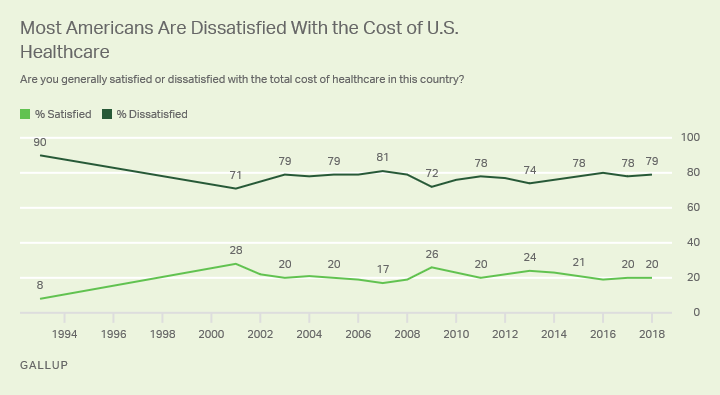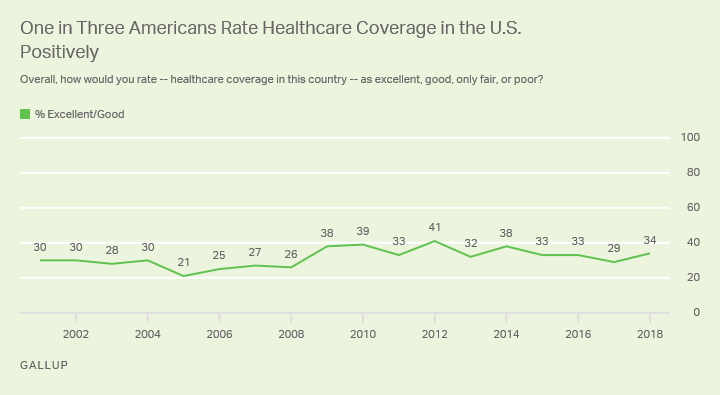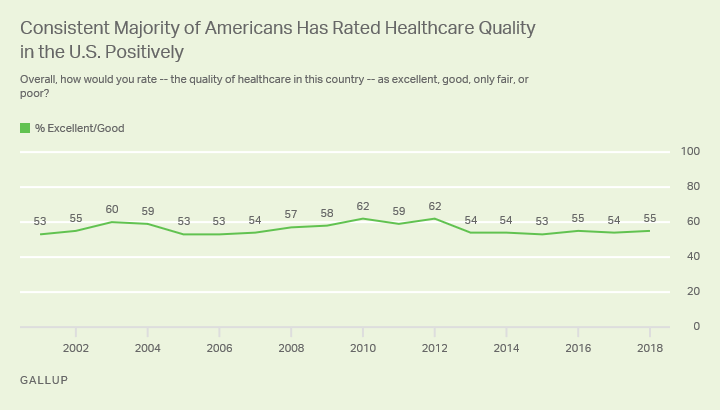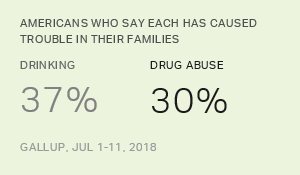Story Highlights
- 20% of Americans are satisfied with healthcare costs
- 34% in U.S. say healthcare coverage is excellent or good
- 25% say cost is top U.S. health problem, 22% say access
WASHINGTON, D.C. -- Most Americans continue to see healthcare costs in the U.S. as a major issue. One in five (20%) are currently satisfied with the total cost, while 79% are dissatisfied, in line with Gallup's overall trend since 2001. Satisfaction with U.S. healthcare costs has never exceeded 28%, and was as low as 8% in May 1993, when President Bill Clinton was launching his ultimately failed attempt to reform the healthcare system.

The latest results are based on Gallup's annual Healthcare survey, conducted Nov. 1-12.
Costs are not Americans' only concern with the healthcare system. The public is also highly critical of healthcare coverage in the U.S. Thirty-four percent describe healthcare coverage as excellent or good, while 40% say it is only fair and 26% poor.
Americans have been somewhat more positive about U.S. healthcare coverage during the Barack Obama and Donald Trump administrations than they were in the prior eight years under George W. Bush. Between 2001 and 2008, an average of 27% of Americans rated healthcare coverage as excellent or good, with the percentage never exceeding 30%. Since 2009, the average has been 35%, although it has been below that mark each of the past four years.

In November 2009, as Congress was debating healthcare legislation, the percentage of Americans satisfied with health coverage jumped from 26% to 38%, perhaps because those opposed to what became the Affordable Care Act were more inclined to view the status quo positively.
The high point in ratings of U.S. healthcare coverage, 41%, came shortly after Obama's re-election. By that time, some of the provisions of the Affordable Care Act had gone into effect, including allowing eligibility for people up to age 26 to stay on their parents' healthcare plans. Forty-eight percent approved of the law in the November 2012 poll, which was the highest in the trend until it surpassed a majority in the spring of 2017 after Republicans attempted to repeal the law.
Americans Pleased With the Quality of Healthcare
Quality is one aspect of U.S. healthcare Americans are pleased with -- 55% rate U.S. healthcare quality as excellent (17%) or good (38%). Thirty-one percent believe quality is only fair and 14% say it is poor.
A majority of U.S. adults have consistently rated healthcare quality positively, including highs of 62% in 2010 and 2012.

Americans See Cost and Access as the Most Urgent Health Problems
Consistent with their concerns about healthcare costs and coverage, Americans are most likely to identify cost and access to healthcare when asked to name the most urgent health problem facing the country. One in four Americans mentioned an issue related to the cost of healthcare in the latest survey, while nearly as many, 22%, mentioned something related to healthcare access. These two issues have topped the list each year since 2003.
The high ranking of cost and access over the last 15 years reflects a shift in Americans' concerns about health in the U.S. from years earlier when specific diseases or health threats topped the list. From 1987 through 1997, the top-mentioned national health issue was AIDS (1987-1997); in 1999 it was cancer (1999) and in 2001, following anthrax-laced letters being sent to high profile targets in the media and federal government, it was bioterrorism.
Insurance coverage for individuals with pre-existing conditions was featured prominently in much of the Democratic Party's election messaging this year. Nevertheless, the broader issue of healthcare access hasn't gained more traction as a top-of-mind healthcare concern, with 22% today mentioning it vs. 24%, a year ago. At the same time, the 25% now mentioning cost as the top problem is up from 16% in 2017, but it is similar to the levels recorded in the two prior years.
While cost and access are by far the most common concerns, several other health issues are on the minds of sizable segments of Americans.
- Ten percent of Americans say drug or alcohol abuse is the most urgent problem, down slightly from 14% last year. Prior to 2017, the percentage citing substance abuse had never been higher than 6%, and the increase may reflect the opioid crisis.
- Ten percent cite cancer as the most pressing issue this year, similar to past years.
- Obesity rounds off the top five mentioned issues, garnering 7% of mentions.
| 2018 | 2017 | 2016 | |||||||||||||||||||||||||||||||||||||||||||||||||||||||||||||||||||||||||||||||||||||||||||||||||
|---|---|---|---|---|---|---|---|---|---|---|---|---|---|---|---|---|---|---|---|---|---|---|---|---|---|---|---|---|---|---|---|---|---|---|---|---|---|---|---|---|---|---|---|---|---|---|---|---|---|---|---|---|---|---|---|---|---|---|---|---|---|---|---|---|---|---|---|---|---|---|---|---|---|---|---|---|---|---|---|---|---|---|---|---|---|---|---|---|---|---|---|---|---|---|---|---|---|---|---|
| % | % | % | |||||||||||||||||||||||||||||||||||||||||||||||||||||||||||||||||||||||||||||||||||||||||||||||||
| Cost | 25 | 16 | 27 | ||||||||||||||||||||||||||||||||||||||||||||||||||||||||||||||||||||||||||||||||||||||||||||||||
| Access | 22 | 24 | 20 | ||||||||||||||||||||||||||||||||||||||||||||||||||||||||||||||||||||||||||||||||||||||||||||||||
| Drug/Alcohol abuse | 10 | 14 | 3 | ||||||||||||||||||||||||||||||||||||||||||||||||||||||||||||||||||||||||||||||||||||||||||||||||
| Cancer | 10 | 11 | 12 | ||||||||||||||||||||||||||||||||||||||||||||||||||||||||||||||||||||||||||||||||||||||||||||||||
| Obesity | 7 | 7 | 8 | ||||||||||||||||||||||||||||||||||||||||||||||||||||||||||||||||||||||||||||||||||||||||||||||||
| Diabetes | 2 | 2 | 3 | ||||||||||||||||||||||||||||||||||||||||||||||||||||||||||||||||||||||||||||||||||||||||||||||||
| Mental Illness | 2 | 3 | 3 | ||||||||||||||||||||||||||||||||||||||||||||||||||||||||||||||||||||||||||||||||||||||||||||||||
| Heart disease | 1 | 1 | 2 | ||||||||||||||||||||||||||||||||||||||||||||||||||||||||||||||||||||||||||||||||||||||||||||||||
| Finding cures for diseases | 1 | <1 | 1 | ||||||||||||||||||||||||||||||||||||||||||||||||||||||||||||||||||||||||||||||||||||||||||||||||
| Government Interference | 1 | 1 | <1 | ||||||||||||||||||||||||||||||||||||||||||||||||||||||||||||||||||||||||||||||||||||||||||||||||
| AIDS | 1 | <1 | <1 | ||||||||||||||||||||||||||||||||||||||||||||||||||||||||||||||||||||||||||||||||||||||||||||||||
| Flu/Viruses | <1 | <1 | 2 | ||||||||||||||||||||||||||||||||||||||||||||||||||||||||||||||||||||||||||||||||||||||||||||||||
| Other | 10 | 10 | 8 | ||||||||||||||||||||||||||||||||||||||||||||||||||||||||||||||||||||||||||||||||||||||||||||||||
| No opinion | 8 | 9 | 11 | ||||||||||||||||||||||||||||||||||||||||||||||||||||||||||||||||||||||||||||||||||||||||||||||||
| Gallup | |||||||||||||||||||||||||||||||||||||||||||||||||||||||||||||||||||||||||||||||||||||||||||||||||||
Implications
Healthcare continues to be a major issue in U.S. politics even after the passage of the Affordable Care Act in 2010. Americans' frustrations seem to center largely on healthcare costs and access. The law has done little to reverse the course of healthcare inflation, and the prices of policies on the government's healthcare exchange have risen dramatically in some markets. But the law has increased access, noted by the significant decline in the percentage of uninsured.
Republican attempts to weaken the law, by dropping the "individual mandate" requirement and their attempts to remove protections for those with pre-existing conditions, became a major campaign issue in this fall's midterm elections. Prior to the election, Gallup found 80% of Americans reporting that healthcare would be extremely or very important to how they vote, the highest percentage for any issue.
Given this, and that Americans have consistently cited cost and access as the most pressing health problem facing the U.S., the public sees the need for more government action on the issue. Passage of the ACA in 2010 did not settle the matter for Americans, nor have efforts to repeal it. The new Democratic majority in the House of Representatives plans to make healthcare reform a major part of its agenda. Whether it can be resolved may depend on their ability to fashion a bipartisan solution that brings Republicans and Democrats together on the issue.
View complete question responses and trends.
Learn more about how the Gallup Poll Social Series works.




